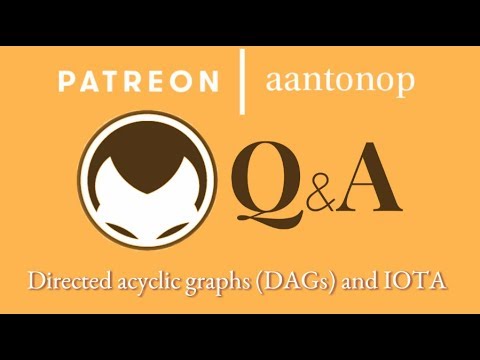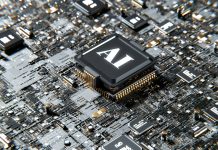What is your opinion on directed acyclic graphs (DAGs) and whether they can achieve the same level of decentralisation, security, and censorship resistance? DAGs are not vaporware, but the cryptocurrency projects using them mostly employ proof-of-stake (PoS) or proof-of-authority consensus mechanisms, which cannot be compared to proof-of-work (PoW) yet because they have not been tested at the same scale. PoW in Bitcoin, with a thermodynamic cost, will be hard to replace. Even though IOTA employs a PoW-type mechanism, they technically use proof-of-authority because IOTA is currently reliant on one special “Coordinator” node, run by their Foundation, to verify all transactions; if they were to shut it off today, we have no idea whether the other ‘sub nodes’ would be able to maintain its current level of security. We can begin to make real comparisons once it is no longer centralised.
This is a question from the patron-only live Q&A which took place on January 27th 2018. If you want early-access to talks and a chance to participate in the monthly live Q&As with Andreas, become a patron: https://www.patreon.com/aantonop
RELATED:
Altcoins and the scaling debate – https://youtu.be/slbpdW-H3yk
Do altcoins threaten to replace bitcoin? – https://youtu.be/w-V_5EWyU5c
The Scaling Rites of Passage – https://youtu.be/rZi86_ovB3Y
Scaling, trust, and trade-offs – https://youtu.be/vCxmHwqyJWU
Scaling complex systems – https://youtu.be/dm9m1oQr6Ks
Governance trade-offs in decentralised systems – https://youtu.be/dtwaW79Fj7c
Governance and the transaction fee market – https://youtu.be/gdknUUVOdHU
Unstoppable code – https://youtu.be/AQx3E3F8Kz4
We all started as critics – https://youtu.be/-jvefuVRwYA
Why running a node is important – https://youtu.be/oX0Yrv-6jVs
The new experimental science of consensus algorithms – https://youtu.be/6N5XlU7Iajk
Security in proof-of-work vs. proof-of-stake – https://youtu.be/dstjlfW4-g8
Proof-of-Work (PoW), Proof-of-Stake (PoS), Delegated Proof-of-Stake (DPoS) – https://youtu.be/3W_3AQrQEOM
Consensus with decentralized oracles and real-world variables – https://youtu.be/8bYmK6sZL00
Intrinsic vs. extrinsic assets – https://youtu.be/KDtfFNZy9xg
What is mining? – https://youtu.be/t4p4iMqmxbQ
Energy consumption – https://youtu.be/2T0OUIW89II
Solar energy and mining in space – https://youtu.be/cusakcpa8AM
What is the biggest threat? – https://youtu.be/1-XUbH1F0Os
Immutability and Proof-of-Work: The Planetary Scale Digital Monument – https://youtu.be/rsLrJp6cLf4
Bitcoin: “Failing to Scale” – https://youtu.be/bFOFqNKKns0
Ethereum, ICOs, and Rocket Science – https://youtu.be/OWI5-AVndgk
The Lion and the Shark: Divergent Evolution in Cryptocurrency – https://youtu.be/d0x6CtD8iq4
Andreas M. Antonopoulos is a technologist and serial entrepreneur who has become one of the most well-known and respected figures in bitcoin.
Follow on Twitter: @aantonop https://twitter.com/aantonop
Website: https://antonopoulos.com/
He is the author of two books: “Mastering Bitcoin,” published by O’Reilly Media and considered the best technical guide to bitcoin; “The Internet of Money,” a book about why bitcoin matters.
THE INTERNET OF MONEY, v1: https://www.amazon.co.uk/Internet-Money-collection-Andreas-Antonopoulos/dp/1537000454/ref=asap_bc?ie=UTF8
[NEW] THE INTERNET OF MONEY, v2: https://www.amazon.com/Internet-Money-Andreas-M-Antonopoulos/dp/194791006X/ref=asap_bc?ie=UTF8
MASTERING BITCOIN: https://www.amazon.co.uk/Mastering-Bitcoin-Unlocking-Digital-Cryptocurrencies/dp/1449374042
[NEW] MASTERING BITCOIN, 2nd Edition: https://www.amazon.com/Mastering-Bitcoin-Programming-Open-Blockchain/dp/1491954388
Subscribe to the channel to learn more about Bitcoin & open blockchains!
Music: “Unbounded” by Orfan (https://www.facebook.com/Orfan/)
Outro Graphics: Phneep (http://www.phneep.com/)
Outro Art: Rock Barcellos (http://www.rockincomics.com.br/)
source
















How mining with ASICs is decentralized, a very very few companies areable to make cutting edge ASIC devices, so if I own such company I wont sell a very profitable chips to somebody else to make more profit with the chips I produce OR if I want to destroy bitcoin (if I am chinese or US government for example) I will do prohibition/confiscation of those chips, then I will destroy this network and everybodys free money and will let them to use my shitUSD. I how there is alternative – IOTA, Maidsafe something like those, but PoW is not thee future, it's dead end.
NANO works well.
IOTA kill the coordinator now is more autonomous and efficient.
@aantonop I am sorry but you need to familiarize yourself in regards to the technology. DAG, especially the Tangle is a completely different distributed approach compared to not just slow but centralized mining system with hashing capabilities along the old proof of work methodology. This is a completely different tech that even you don't understand, apparently.
Even Bitcoin itself has been centralized for a period of time. Please educate yourself, Andreas before giving a speech world live next time.
Thank you and wish you all the best!
Even if DAGs don't ever match the blockchain in some ideological aspects, from a infrastructural/industrial point of view the trade offs are well worth it they provide better scalability and consume less energy. And using your same argument about blockchain and scalability as technology evolves, why wouldn't you say the same thing about DAGs and decentralization.
proof of worlk already fails : 3 ppools are boss in bitcoin. they can collude and start double spending anyday. even dpos with more decentralisation are better as 3 pools lol we need more decentralisation.. not less .bitcoin is centralized as f*ck. this is even worse as banks
Bitcoin is far more centralized then most common POW (Like Ethereum). Its being held up by 8 main miners while Ethereum at least has far more.
IOTA while is centralized could be far far far better than ethereum aswell. So your example of Bitcoin is just plain wrong. Ethereum is a much better example.
May I translate this video to Chinese and publish it to a video site such as Bilibili hosted in China? Due to Great Fire Wall, Youtube cannot be accessed from mainland China without VPN.
Please check Radix Andreas. New consensus algorithm, 7 years in the making, scalable, fast, stable coin, privacy, dapps and runs even on raspberry pi. Ah and as a bonus you can make your own credit cards that work anywhere in the world with existing pos.
Short, concise, sharp, clear, unequivocal. As usual. Thanks Andreas. Keep up the great teachings. Best from Catalunya, the land of Barcelona.
When it comes to DAG people forget to mention Byteball while probably that's the most complete and feature rich DAG implementation with beautiful multiplatform GUI wallets, smart contacts, custom assets, private assets, chat bots and more. Far from vaporware.
Let's all wait and see when IOTA turns 9 years old and lets having this discussion again. Bitcoin and the blockchain have a good head start, but it seems like Bitcoin is needing to learn new tricks to stay in the game. If Bitcoin and the Blockchain had been around as long as IOTA. What would your perspective be on Bitcoin and the blockchain, that would be a far better comparison / judgment call.
Not a violent person but I would love to slap the shit out of people who dislike this guys work :s
Everybody needs to chill a bit. IOTA is in Beta still. We'll see if it works or not. But BTC & ETH were not perfect when they started. Everything adds to the innovation.
Doesn't matter which particular coin does better. What really matters is that there is no way back. The power is changing sides. We are in a tipping point and this will be HUGE. We are part of it.
Whether is IOTA, BTC or ETH… the future looks great! Enjoy the ride, boys!
Nano uses DAG but it's not centralized.
I wish he would have a blackboard. Some of this stuff just gets so buzzword heavy that I just can't follow it.
i bought your book, mastering bitcoin . but you seriously need to step up your research on iota. it's painfull to watch tbh
Been waiting for youre opinion on this for a while
PoW doesn't make sense on an operational aspect in the future, when you're scaling for 10-20 yrs in the future and talking about petabytes of data being moved around
Check into Nano!
You should comment on Decred’s PoW and PoS mix, which the mix itself was optimized.
IOTA is proof of work! Tangle uses proof of work to validate transactions.
Most DAGs uses weighted voting, or something similar, for conflict resolution. Similar to NoSQL distributed databases. Banks don't use NoSQL database to manage the currency for these very reasons. Centralised ACID databases are ideal for money management. PoW single threads the transactions making it ideal for an adversarial public network protocol and removes those nasty edge case race conditions.
NANO doesn't have the coordinator and scale 🙂
PoW is possible in a DAG architecture. IOTA use PoW. Nano uses PoW. While some others do not.
You are a very intelligent person, but you forget something very important in relation to IOTA: it is not only about DLT but about a paradigm shift in computer science. With IOTA we talk about Ternary computation, trits, qubits. That is, another level in computer science and not just a DLT software.
is Nano a DAG? Seems more like a DPOS network
IOTA uses proof of work, so not sure why you are going on about it trying to replace that.
About the coordinator: Yes with coordinator iota is somewhat centralized. But what is necessary to remove it is simply the network being big enough so that it has enough hashing power so that a 51% attack becomes impossible.
They are running simulations to see how much is needed and based on that they will determine when to turn it off.
Coordinator limits tangle to about 1000tps so it needs to be turned off at some point unleash the tangles true potential. There is no reason to keel it in place after a certain point. But removing it too soon might risk users funds and nobody wants that.
Some bitcoin mining pools have had over 51% of the mining power at some point which is even more centralized then the coordinator is.
Man with the most knowledge about bitcoin out there!
WHY THE FUCK IS THERE ALMOST 11K VIEWS AND ONLY 574 likes? HIT THAT THUMBS UP BUTTON GUYS IF THE INFORMATION IS WORTH SHARING!
Efcharisto poli ^_^
Holochain ?
Sir can u tell us ur thought on monero and ring signuture,zero knowledge zcash,zenchash secure node etc